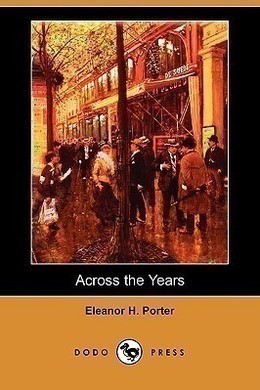
-
EPUB 231 KB
-
Kindle 293 KB
-
Support epubBooks by making a small $2.99 PayPal donation purchase.
Description
Surprise a young reader in your life with this collection of charming and insightful short stories from the pen of author Eleanor H. Porter, best known for the widely acclaimed novel Pollyanna. Touching on an array of engaging subjects and timeless themes, these stories showcase Porter’s gift for crafting memorable characters that often find themselves in unusual or trying circumstances that test their mettle.
215 pages with a reading time of ~3.50 hours (53915 words), and first published in 1923. This DRM-Free edition published by epubBooks, 2014.
Community Reviews
There are currently no other reviews for this book.
Excerpt
”‘Tain’t more ‘n a month ter Christmas, Lyddy Ann; did ye know it?” said the old man, settling back in his chair with a curiously resigned sigh.
“Yes, I know, Samuel,” returned his wife, sending a swift glance over the top of her glasses.
If Samuel Bertram noticed the glance he made no sign. “Hm!” he murmured. “I’ve got ten neckerchiefs now. How many crocheted bed-slippers you got?–eh?”
“Oh, Samuel!” remonstrated Lydia Ann feebly.
“I don’t care,” asserted Samuel with sudden vehemence, sitting erect in his chair. “Seems as if we might get somethin’ for Christmas ‘sides slippers an’ neckerchiefs. Jest ‘cause we ain’t so young as we once was ain’t no sign that we’ve lost all our faculty for enj’yment!”
“But, Samuel, they’re good an’ kind, an’ want ter give us somethin’,” faltered Lydia Ann; “and–”
“Yes, I know they’re good an’ kind,” cut in Samuel wrathfully. “We’ve got three children, an’ each one brings us a Christmas present ev’ry year. They’ve got so they do it reg’lar now, jest the same as they–they go ter bed ev’ry night,” he finished, groping a little for his simile. “An’ they put jest about as much thought into it, too,” he added grimly.
“My grief an’ conscience, Samuel,–how can you talk so!” gasped the little woman opposite.
“Well, they do,” persisted Samuel. “They buy a pair o’ slippers an’ a neckerchief, an’ tuck ‘em into their bag for us–an’ that’s done; an’ next year they do the same–an’ it’s done again. Oh, I know I’m ongrateful, an’ all that,” acknowledged Samuel testily, “but I can’t help it. I’ve been jest ready to bile over ever since last Christmas, an’ now I have biled over. Look a-here, Lyddy Ann, we ain’t so awful old. You’re seventy-three an’ I’m seventy-six, an’ we’re pert as sparrers, both of us. Don’t we live here by ourselves, an’ do most all the work inside an’ outside the house?”
“Yes,” nodded Lydia Ann timidly.
“Well, ain’t there somethin’ you can think of sides slippers you’d like for Christmas–‘specially as you never wear crocheted bed-slippers?”
Lydia Ann stirred uneasily. “Why, of course, Samuel,” she began hesitatingly, “bed-slippers are very nice, an’–”
“So’s codfish!” interrupted Samuel in open scorn. “Come,” he coaxed, “jest supposin’ we was youngsters again, a-tellin’ Santa Claus what we wanted. What would you ask for?”
Lydia Ann laughed. Her cheeks grew pink, and the lost spirit of her youth sent a sudden sparkle to her eyes. “You’d laugh, dearie. I ain’t a-goin’ ter tell.”
“I won’t–‘pon honor!”
“But it’s so silly,” faltered Lydia Ann, her cheeks a deeper pink. “Me–an old woman!”
“Of course,” agreed Samuel promptly. “It’s bound ter be silly, ye know, if we want anythin’ but slippers an’ neckerchiefs,” he added with a chuckle. “Come–out with it, Lyddy Ann.”
“It’s–it’s a tree.”
“Dampers and doughnuts!” ejaculated Samuel, his jaw dropping. “A tree!”
“There, I knew you’d laugh,” quavered Lydia Ann, catching up her knitting.
“Laugh? Not a bit of it!” averred Samuel stoutly. “I–I want a tree myself!”
“Ye see, it’s just this,” apologized Lydia Ann feverishly. “They give us things, of course, but they never make anythin’ of doin’ it, not even ter tyin’ ‘em up with a piece of red ribbon. They just slip into our bedroom an’ leave ‘em all done up in brown paper an’ we find ‘em after they’re gone. They mean it all kind, but I’m so tired of gray worsted and sensible things. Of course I can’t have a tree, an’ I don’t suppose I really want it; but I’d like somethin’ all pretty an’ sparkly an’–an’ silly, you know. An’ there’s another thing I want–ice cream. An’ I want to make myself sick eatin’ it, too,–if I want to; an’ I want little pink-an’-white sugar pep’mints hung in bags. Samuel, can’t you see how pretty a bag o’ pink pep’mints ’d be on that green tree? An’–dearie me!” broke off the little old woman breathlessly, falling back in her chair. “How I’m runnin’ on! I reckon I am in my dotage.”
For a moment Samuel did not reply. His brow was puckered into a prodigious frown, and his right hand had sought the back of his head–as was always the case when in deep thought. Suddenly his face cleared.
“Ye ain’t in yer dotage–by gum, ye ain’t!” he cried excitedly. “An’ I ain’t, neither. An’ what’s more, you’re a-goin’ ter have that tree–ice cream, pink pep’mints, an’ all!”
“Oh, my grief an’ conscience–Samuel!” quavered Lydia Ann.
“Well, ye be. We can do it easy, too. We’ll have it the night ‘fore Christmas. The children don’t get here until Christmas day, ever, ye know, so ’t won’t interfere a mite with their visit, an’ ‘twill be all over ‘fore they get here. An’ we’ll make a party of it, too,” went on Samuel gleefully. “There’s the Hopkinses an’ old Mis’ Newcomb, an’ Uncle Tim, an’ Grandpa Gowin’–they’ll all come an’ be glad to.”
“Samuel, could we?” cried Lydia Ann, incredulous but joyous. “Could we, really?”
